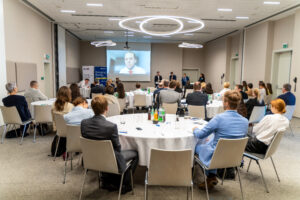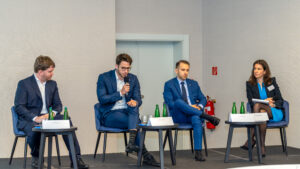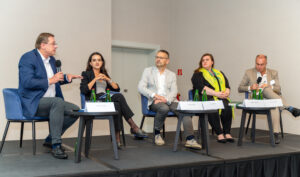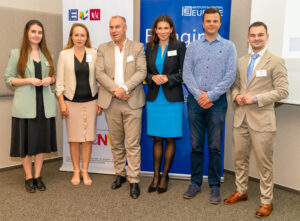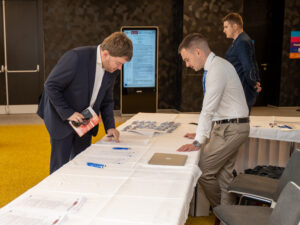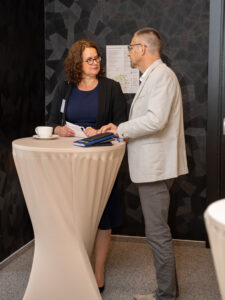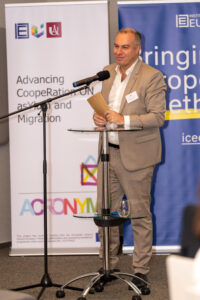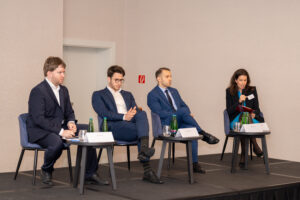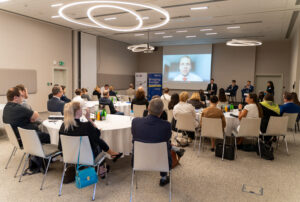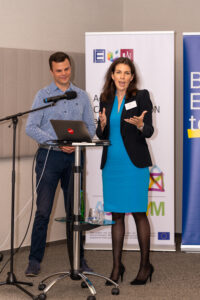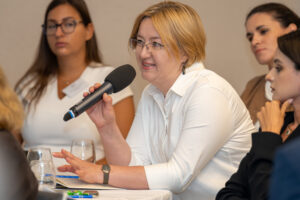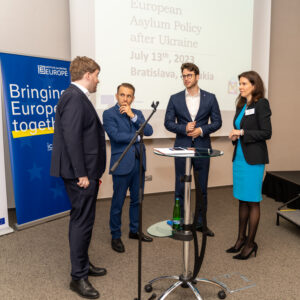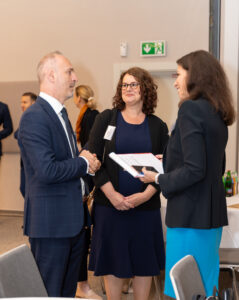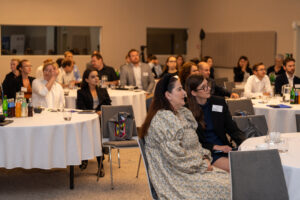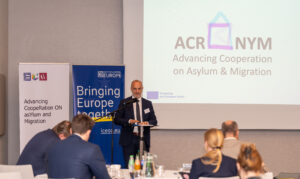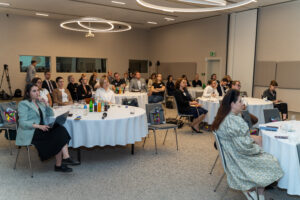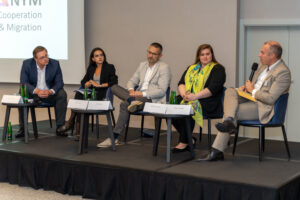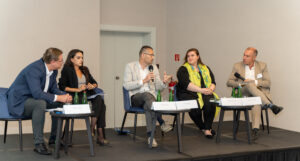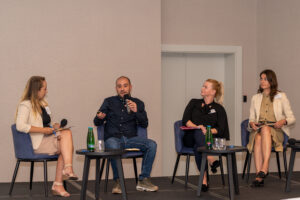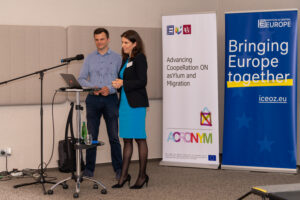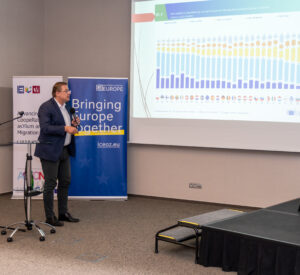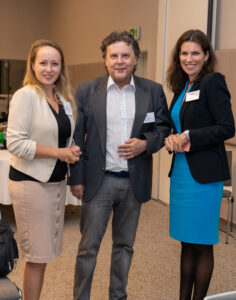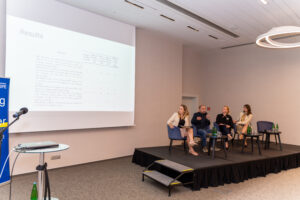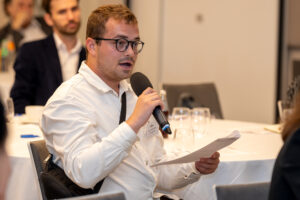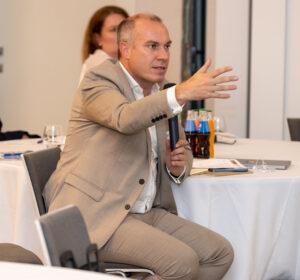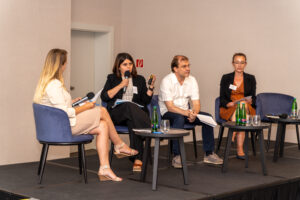First annual conference on asylum and migration
Conference – European asylum policy after Ukraine
The first annual conference on migration and asylum under the ACRONYM project, titled The European Asylum Policy After Ukraine took place in Bratislava on July 12-13, 2023. The conference proved to be an enriching and dynamic event that brought together politicians, policy makers, academics and experts on migration and asylum from various institutions to engage in insightful discussions and meaningful networking.
With a diverse range of thought-provoking sessions, policy discussions, and keynote addresses, the conference fostered a platform for exchange of innovative ideas and cutting-edge research. The keynote address, titled “A Matter of Will, Not Capacity: European Asylum Policy After Ukraine” by François Gemenne from the University of Liège, marked the opening of the conference. Following this, the first panel was introduced by Katarína Cséfalvayová (ICE Director), who also welcomed speakers within the first panel, organised in the form of a policy dialogue. The panel featured Slovak Members of Parliament Andrej Stančík (Demokrati) and Martin Klus (Sme Rodina), politician Ábel Ravasz (Saska) and representative of the Ministry of Foreign and European Affairs of the Slovak Republic, Ivan Kováč. This panel set the stage for the conference by initiating conversations about migration and asylum policies and their implications and challenges in the aftermath of the Russian war in Ukraine.
After the first panel, the audience had the chance to listen to Valon Halimi, the IOM Chief of Mission in Slovakia. In his address, he emphasised the significance of perceiving migration as an essential component of society, both historically and presently, rather than merely as a problem demanding immediate solutions. This segment of the conference highlighted the pressing need to change negative discussions and dominant narratives surrounding migration.
The second panel led by François Gemenne (Université de Liège) united experts and academics Michal Vašečka (Bratislava Policy Institute), Ján Orlovský (Ministry of Interior of the Slovak republic), Clarissa Tabosa (Comenius University Bratislava) and Tinatini Tsertsvadze (UNICEF) who contributed to the discussion with data, their personal from-the-ground experience and recommendations to policy makers with respect to migration and asylum policies.
Part of the conference also included the introduction of the Central European Migration Research Hub, an online platform designed to unite and connect academics, policymakers, experts, and other stakeholders in the field of asylum and migration. The goal of this unified platform is to support the strengthening of interdisciplinary collaboration through networking and sharing of expertise and experiences. Additionally, the platform aims to help researchers make their work accessible to the public and colleagues in the region. Among other functions, this platform serves as an information centre providing updates on the latest publications in the field of migration, relevant conferences, and funding opportunities for projects in this area.
In the afternoon, two academic panels, composed of researchers and academics, introduced various aspects of migration and asylum studies. In the first panel, attendees had the opportunity to hear a presentation by Mgr. Ángel Torres-Adán, PhD. (Slovak Academy of Sciences), who investigates people’s willingness to help migrants, especially Ukrainian refugees in Slovakia. His presentation, titled “Who’s willing to help? An analysis of individual willingness to help Ukrainian refugees in Slovakia,” elucidated the key and decisive factors influencing people’s willingness to help migrants. Another intriguing presentation, “Public service translation and interpreting in refugee crisis: Challenges and barriers in migrants’ access to mental healthcare in Slovakia” by Soňa Hodáková, PhD., (Constantine the Philosopher University in Nitra) highlighted the aspects and problems faced by translators and officials working with migrants, which greatly impact many aspects of migrants’ lives, such as mental and physical health resulting from life changes, often associated with trauma from war and resettlement. Researcher Mag. Malwina Talik, MA, (Institute for the Danube Region and Central Europe) discussed aspects and differences in the perception of migrants of various nationalities in a presentation titled “Refugees (Un)welcome! A Comparative Analysis of the Response to Refugees and Other Migrants at the Poland-Belarus and Poland-Ukraine Borders: Lessons Learned for the European Asylum Policy.”
The presentation “Care in Crisis: Failures to Guarantee the Sexual and Reproductive Health and Rights of Refugees from Ukraine in Hungary, Poland, Romania and Slovakia” by Mgr. Martina Zboroňová (Freedom of Choice / Comenius University Bratislava) highlighted many barriers and obstacles regarding health aspects that migrants, especially migrant women coming to Slovakia, must overcome. Another aspect of migration in Slovakia was presented by Mgr. Juraj Marušiak, PhD. (Slovak Academy of Sciences) in the presentation “War in Ukraine and its impact on Slovakia´s migration policy with the main focus on refugees of Roma origin“. The presentation highlighted the influence of Slovakia’s migration policies on migrants of Roma origin and the obstacles and difficulties they face in Slovakia. Last but not least, the presentation titled “The importance of living heritage safeguarding among displaced communities from Ukraine” by Mgr. Martina Wilsch, PhD. (Slovak Academy of Sciences) emphasised the need and importance of protecting the living cultural heritage of displaced and affected communities in Ukraine due to war. The protection of cultural heritage is crucial not only for preserving culture and building psychological resilience against aggression but also for strengthening mutual relations between the host society and resettled communities.
The first edition of the Migration and Asylum Conference, held in Bratislava, brought together numerous experts, providing a space for dynamic discussions about the migration, while also highlighting its often negative perception within society. Presentations, discussions, and the establishment of a platform for researchers to connect were just a fraction of the conference’s success. Positive feedback confirms that there is an increasing interest in the issues of migration and asylum policy, not only from a professional but also from a human perspective. We believe that these stimulating discussions will continue to develop and evolve in future editions of the conference.
